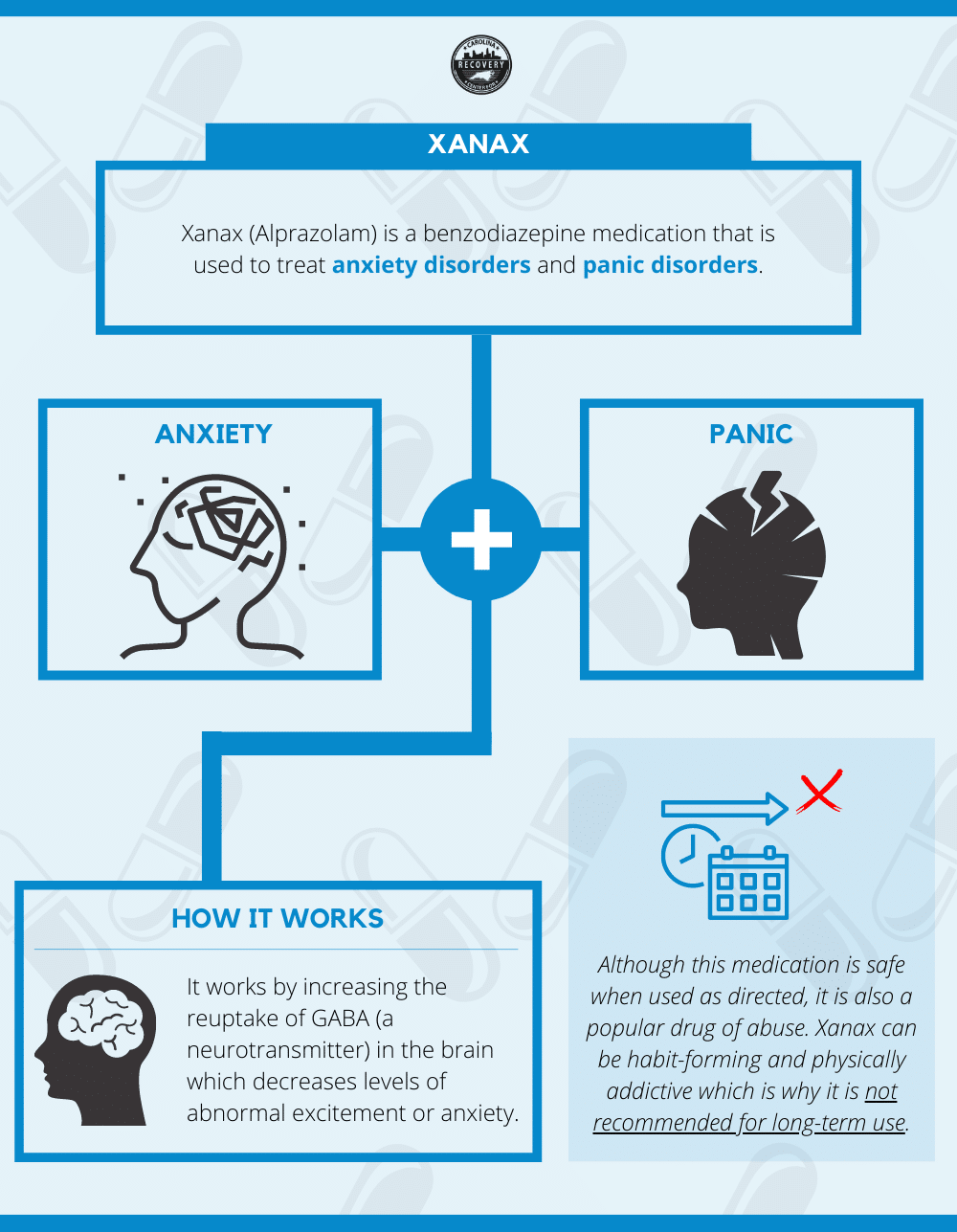Xanax Addiction Treatment in North Carolina

Medically Verified: 2/1/24
Medical Reviewer
Chief Editor

All of the information on this page has been reviewed and verified by a certified addiction professional.
Xanax (alprazolam) is a popular benzodiazepine medication that can be prescribed by doctors to treat anxiety and panic disorders. While Xanax can be highly effective for the short-term management of anxiety, long-term use or misuse can lead to physical dependence and addiction. As the most widely prescribed psychotropic medication in the United States, many of the more than 48 million Xanax prescriptions written each year land in the hands of dealers and drug users on the streets.[1]
Detoxing from Xanax can be dangerous, and staying sober can prove extremely challenging due to the long-lasting rebound symptoms that occur when a person abruptly stops taking Xanax. A Xanax addiction treatment center can offer medically-supervised detox and comprehensive rehabilitation to give individuals the tools they need to recover.

Signs of Xanax Abuse and Addiction
Xanax tolerance develops very quickly. After just one week of abusing the drug, users may realize that they have to take higher doses to feel the same effects as they used to feel with a lower dose.
The longer a person abuses Xanax and the higher the dose they take, the more physically dependent they will become. If the user decides to stop taking Xanax, they will likely experience uncomfortable and concerning withdrawal symptoms. Both tolerance and withdrawal (dependence) are two signs that a person is abusing and addicted to Xanax.
Like other benzodiazepines, alprazolam is a central nervous system depressant. It causes a variety of calming and relaxing effects that may be noticeable in people who are abusing the drug. Side effects of Xanax include:
- Drowsiness
- Slurred speech
- Poor balance or coordination
- Dizziness
- Memory problems
- Difficulty concentrating
- Confusion
- Slowed movements and reaction time
Someone who is addicted to Xanax may display common , such as:
- Continuing to use Xanax even after it causes problems in one’s social, physical, or mental health
- Loss of interest in activities that were previously enjoyed
- Lying to friends and family about drug use
- Spending excess time using and recovering from the effects of Xanax
- Engaging in concerning risk-taking or illegal behaviors
- Having drug cravings
People who take Xanax as prescribed may develop a physical dependence on the drug, but that doesn’t mean they are addicted. They can simply work with their doctor to slowly taper off of alprazolam. However, people who display behavioral signs of obsessive and compulsive drug use are better off seeking help from a professional benzodiazepine rehab center.
Medical Detox for Xanax Dependence
Because of the dangerous and life-threatening can cause, it is always recommended to detox in a residential medical facility. Early withdrawal may produce symptoms like anxiety, depression, agitation, and sweating, but late withdrawal may cause seizures, hallucinations, tremors, and suicidal ideation.
Fortunately, doctors can prescribe alprazolam or another benzodiazepine at a lower, controlled dose to alleviate these symptoms of withdrawal. Over the course of detox, the patient’s dose will slowly be reduced, gradually weaning them off of benzodiazepines rather than forcing them to endure withdrawal. A gradual taper can prevent withdrawal complications and make the detox process more comfortable.[2]
Patient’s vital signs and additional symptoms are monitored closely throughout the duration of detox. Once they are medically stable, they may transition to an inpatient or outpatient addiction treatment program.
Treating Rebound Anxiety and Symptoms
Xanax and other benzodiazepines are notorious for causing “rebound” symptoms. Rebound symptoms refer to symptoms that were originally alleviated by taking Xanax. For example, Xanax can reduce anxiety and stop panic attacks, but if a person stops taking it, they are at increased risk for anxiety and panic attacks.
Rebound symptoms can be very difficult to cope with and they can vary in intensity and duration. They can also appear suddenly without notice. As a result, an important part of Xanax addiction treatment involves getting rebound symptoms under control. This may involve non-benzodiazepine medications, breathing techniques, and other holistic therapies.
Inpatient and Outpatient Xanax Addiction Treatment
Just because Xanax is available via prescription does not mean it is always safe. Data reveals that alprazolam is associated with more ER visits and overdose deaths than the next three most commonly prescribed benzodiazepines (lorazepam, diazepam, and clonazepam).[1] The best way to avoid negative consequences such as these is to get help as soon as possible.
can be treated at an inpatient or outpatient facility. Patients dealing with severe substance use disorder, co-occurring disorders, or post-acute withdrawal syndrome (PAWS) should opt for an inpatient program.
After detox, treatment may consist of:
- Group therapy
- Individual therapy
- Family therapy
- Mental health counseling
- Holistic therapy
- 12-Step facilitation
- Relapse prevention
- Aftercare planning
Xanax rehab programs last between 30 and 90 days, but the length of a person’s stay may vary depending on their progress in treatment, insurance coverage, and unique needs.
Find Xanax Addiction Treatment in North Carolina Today
Here at Carolina Center for Recovery, our comprehensive inpatient and outpatient addiction treatment programs employ evidence-based tactics and individualized treatment services to provide each patient with the care they deserve. If you or a loved one are struggling with addiction, contact us today. An admissions coordinator is available 24/7 to take your call and verify your insurance.
References:

